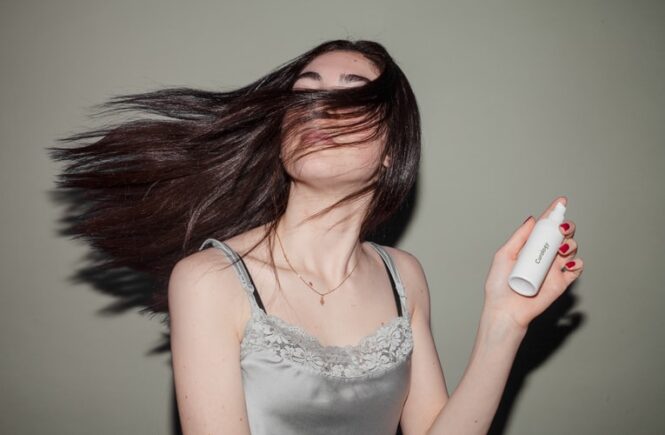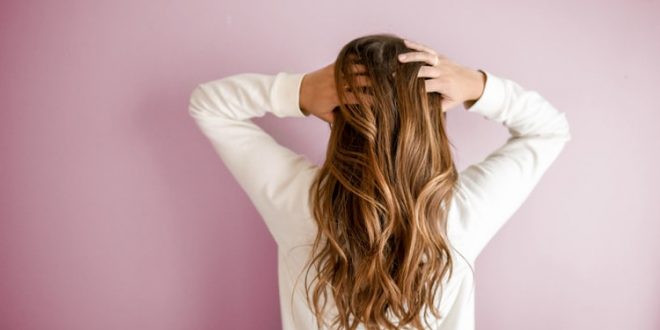Scalp build-up occurs due to the accumulation of the natural, waxy oil called sebum due to overproduction. Natural build-up forms when the excess sebum combines with sweat, hair products, and dead skin cells on the scalp. It can appear in the form of oily and crusty skin flakes, which are often accompanied by an itchy scalp.
Product build-up is composed of residue from hair products such as shampoos, conditioners, styling creams, oils, gels, and foams. Besides sweat and hair products, hard water can accelerate and worsen accumulated residues on the scalp. Hard water contains calcium, and therefore when used with soap or shampoo to clean and wash the scalp, it forms scum which clogs pores and makes it more challenging to wash out the sebum build-up.
The market is flooded with hair products and conventional shampoos, which don’t always yield the desired results and, in some cases, even make the condition worse. Quality shampoos are efficient in washing off crusty build-ups and boosting the overall health of the scalp and hair. Click here to get the guidelines on quality shampoos and conditioners and instructions for deep cleansing of hardened sebum build-up on the scalp.
Besides hyperseborrhea, which is increased sebum production, some other factors may cause or increase scalp build-up. Some of these include:

- Hormone imbalances. An imbalance in the levels of produced pituitary and thyroid Hormones could trigger the overproduction of sebum.
- Lack of a regular hair cleansing routine. When hair oils, dust, and dirt are not cleaned
off on a regular and frequent basis, scalp build-ups may occur.
iii. Digestive disorders. Underlying liver and intestinal problems may disrupt average
Sebum production, leading to excessive quantities forming greasiness in the hair and scalp build-up.
- Poor scalp hygiene. It can increase the risk of getting scalp and certain skin conditions such as dandruff. Careful consideration of hair products used is essential to avoid exposure to chemicals that can trigger scalp build-up.
- Poor diet and metabolic disorder. Healthy foods make a significant impact on the general body’s wellness. Disruption of normal metabolic processes can cause hyperseborrhea.
- Accumulation of microorganisms on the scalp, such as bacteria, parasites, and fungi, can trigger hyperseborrhea, which is a basis for scalp build-up.

Long-term sebum build-up on the scalp can result in complications such as acne, oily dandruff, hair loss, or Seborrheic dermatitis.
Proper and regular shampooing of hair and scalp using a natural, gentle product that suits your hair type is the easiest way to prevent sebum build-up. Warm water is recommended to break down the oily structure while incorporating gentle, circular motion massage on the scalp. It is good practice to massage the scalp using the fingers instead of nails which can injure the scalp and cause irritation.
Conditioner should be applied on the ends only and not on the scalp. Knowing your hair type is crucial to help in selecting the right shampoo ingredients suitable for you. Here are some examples:

- For dry and hardened hair, choose a shampoo that cleanses the hair without extracting a lot of sebum. Such ingredients include alkanolamides, sarcodines, ivy agave, ammonia esters, sodium lauriminodipropionate, and silicone.
- For average-to-dry hair, choose shampoos with Laurent sulphates to remove some sebum from the hair.
- For oily hair, use shampoos with lauryl sulphates or sulfosuccinates that penetrate deeper to remove excess sebum and product residues from the hair.
- For sensitive scalp, use mild products and avoid shampoos with formalin and parabens.
Conventional harsh-chemical-laden shampoos may be effective in washing and clearing the build-up but may be accompanied by some adverse effects on the hair and scalp, which include;
- Irritation of the scalp and stripping off your hair of its natural oils.
- Some of the chemicals present in the shampoo may be endocrine disruptors and associated with causative agents of skin cancer.
- The chemicals may not be environmentally friendly, and thus the associated rinsing water released as wastewater has potentially adverse effects.

Other reliable home remedies for getting rid of sebum build-up include:
- Keeping your hair detangled by gently brushing it helps distribute oils more evenly and reduce scalp build-up. Choose a brush that is easy on your scalp.
- Using Apple cider vinegar which kills bacteria that causes infection of scalp hair follicles.
- Scalp exfoliation. Like exfoliation for the face and other skin, scalp exfoliation using a suitable exfoliate keeps it clear, thus eliminating build-up while enhancing its receptiveness of oil-controlling ingredients.
Healthy shampoos work beyond clarifying purposes and help to flush out the hair follicle of the bacteria, fungus, and yeast, which promote build-up. They contain herbal extracts, essential oils, and zinc.
Some of the common essential oils include:
- Rosemary essential oil is antifungal and an antioxidant that helps to improve blood circulation in the scalp, regulate sebum production, and prevent hair thinning. It also promotes hair growth.
- The lavender essential oil has antimicrobial characteristics and a calming effect on the scalp while reducing itchiness.
- Peppermint essential oil has antimicrobial and antiseptic characteristics, which relieve dry scalp and stimulate hair growth.

Shampoos containing Zinc PCA, also known as Zinc salt, are efficient in resolving several skin conditions and helping irrigate the health of your scalp and hair. It is a combination of Zinc and L-PCA. PCA stands for Pyrrolidone carboxylic acid. PCA serves an excellent role in processes of hydration and energy, which promotes the natural moisturizing of the scalp and hair.
Zinc is an active mineral that acts as a physio-Sebo regulator and helps in retaining skin humidity. Zinc boosts the process of de-clogging hair follicles affected by excess sebum. It is also effective in treating scalp inflammation and fungal attacks.
For healthy hair, it is necessary to maintain a healthy hair routine to keep it clean and protect your hair from drying out. After working out, wash your hair and scalp to prevent the accumulation of sweat, resulting in smelly hair or the formation of build-up. For extreme build-up cases that are non-responsive to home treatment, consult a doctor or a skincare expert.
 Imagup General Magazine 2024
Imagup General Magazine 2024



